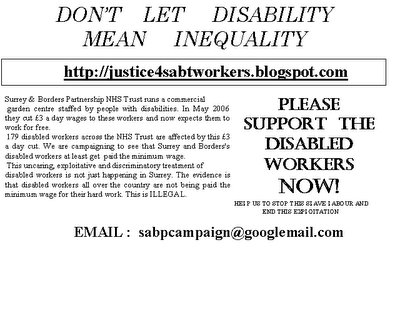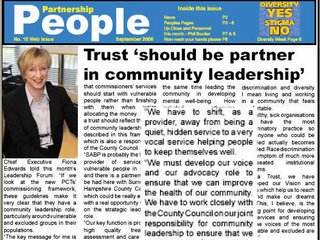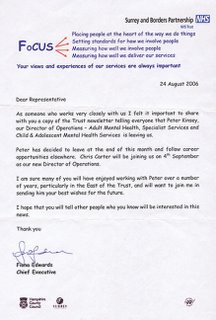 The Bourn Hall Venue in Ewell Surrey. Big thank you to Jill, Tim , Rose and Kim for turning up to support the campaign at the Board meeting or AGM and also to David and Stuart who also raised questions about reinstatement of payments or on other important matters involving service users. It would be great to get your feedback and take on developments yesterday and to use the blog to decide what we should do next to monitor how SABP proceeds with its work services modernisation process. All thoughts, ideas and opinions welcome. How the issue of Therapeutic Payments was dealt with at the Board Meeting
The Bourn Hall Venue in Ewell Surrey. Big thank you to Jill, Tim , Rose and Kim for turning up to support the campaign at the Board meeting or AGM and also to David and Stuart who also raised questions about reinstatement of payments or on other important matters involving service users. It would be great to get your feedback and take on developments yesterday and to use the blog to decide what we should do next to monitor how SABP proceeds with its work services modernisation process. All thoughts, ideas and opinions welcome. How the issue of Therapeutic Payments was dealt with at the Board Meeting At the tenth
Surrey & Borders Partnership NHS Trust Board meeting today in
Bourn Hall , Ewell , Surrey the issue of Therapeutic Payments was the first item on the agenda and the Trust Board unanimously backed Chief Executive Fiona Edwards recommendations that the Trust offer a written apology to all service users affected by the £3 pay cuts and reinstate and backdate payments in a way that did not compromise people's benefits.
Fiona openly admitted that the Trust had made a mistake in its treatment of the garden centre workers and Board Chairman Graham Cawsey was equally open and forthright in describing the embarassing situation the Trust found itself in as ' a problem the Trust had created for itself .
On entering the Board room I overheard another Board Member quietly tell someone else that the Trust had 'made a terrible PR blunder and needed to be more careful about its image ' however as the Board sat silent and sullen as the Chief Executive set out the reasons for her recommendations - re-posted below at (1) - without flinching from taking full responsibility for the mistakes it was clear that the Trust's problems ran far deeper than merely exercising more control over its corporate image.
The Trust had betrayed its own stated values and visions , what was not so clear from Fiona Edwards responses to our questions - see below at (2) was WHY it had done this. This will be discussed later after we have time to digest all the information we got at the meeting and cover exactly how Fiona answered our questions , question by question, in a dedicated Q&A piece once we've had time to compare notes for clarity . Obviously having the minutes would help but its going to be some time before they are agreed so we just have to be careful that bureaucracy isnt allowed to dictate the pace of our campaign as well.
The Chief Executive did make it clear though that the Trust was now seeking to clarify roles based on an objective and proper assessment of service users needs and circumstances in line with the Trusts stated values and visions and that interim Director of Operations Chris Carter , Peter Kinsey's replacement, would be responsible for overseeing this. Fiona also informed the Board that Jo Young, Work services, would look into how this was to be done although no deadline was given, and that the confidence and help of service users, carers and even members of our campaign would be sought to that end.
Unfortunately, Fiona was not so forthcoming on whether the Sainsbury Centre for Mental Health would continue to be involved with the modernisation of SABP's work services and this would seem to be a matter we need to take up with the PCT.
Lastly, thanks to Stanley Rissborough and Fiona Edwards for greeting and making people from the campaign feel welcome and valued at the Board meeting.
(
1) Therapeutic Payments1 Background
Changes to the way that Work Services are provided were subject to consultation
(‘Building on the Best’) during January to April this year.The results of the
consultation confirmed the move to more individualised, locally based employment
and social support services and the importance of offering a range of training and
community based activities, with most of the services moving to Richmond Fellowship over the course of the year. The programme is on schedule, with around half of the centres having transferred from the Trust. Alongside this transfer, the Trust Board agreed (in January 2006) that the practice of awarding ‘therapeutic payments’ would cease on 31st May 2006. Therapeutic payments (usually totalling £3.00 per day) were given as recognition to those attending.They were not intendedto represent payment for work.
In reviewing the impact of ceasing therapeutic payments, the main consideration given was to the impact of National Minimum Wage (NMW) legislation. NMW is currently set at £5.05 per hour (reviewed every October). Applying NMW to the hours for those attending work service activities could adversely impact upon the benefit that people receive. Further, it is unclear where NMW would apply, as people do not attend in order to provide significant output but to undertake training(most work service activities include NVQ assessment), to participate in therapeutic and social activities and, where possible, to prepare for employment. Work service activities are not reliant upon those attending undertaking work and the centres do not create a profit for the Trust.
Other day centres across the Trust have ceased therapeutic payments in line with
the Trust Board decision, although the implementation has been phased over a
longer timescale.
2 Areas of Concern
2.1 Impact on People attending Work Centres
The cessation of therapeutic payments, especially at the garden centres, has caused considerable concern to some people attending and their families, as well as members of the Trust’s Forum for People who Use Services and their Carers (FoCUS) and members of the public. Further, no assessment has been undertaken to ensure that people attending the Work Services activities are either undertaking paid work (for which NMW would apply) in line with benefit regulations or are attending on a voluntary basis for therapeutic or training activities.
2.2 Impact on Service Delivery
Concerns being raised could bring into question the viability of transferring services to external providers, who will not wish to take on any potential liability. Failure to ensure that a proper assessment of activities and individual assessments for people attending could mean that the modernisation in line with the wishes of people we serve (as identified through the consultation feedback) and the commissioners of the service is unable to proceed as agreed.
2.3 Advice to the Trust Board
In reaching the conclusion that therapeutic payments should cease, the information provided by the Trust’s legal advisors was not interpreted fully for the Trust Board. All work service centres were treated in the same way, but the legal advice regarding
four centres (the two garden centres, the printing activity and the travel agent) indicated that some people may indeed be undertaking work in a similar way to
people employed in those centres by the Trust.This cannot be determined without further assessment of the activities undertaken and the purpose of attendance at the
centres.
The option recommended to the Board to cease therapeutic payments had not been discussed with the Trust’s legal advisors.Further, the advice to the Trust indicated
that any decision made by the Board should take into account that the people concerned were very vulnerable and therefore the normal principles of risk management were not appropriate to the decision-making process.
2.4 Wider Impact on the Trust
As a result of the decision to cease therapeutic payments, there is considerableconcern that the Trust has not treated people well.
3 Recommendations
The Trust acknowledges that the decision-making process and its outcomes have been far from satisfactory and adversely impacted on people who attend work services and their families and carers. The Trust is very sorry that this decision was made and apologises unreservedly for the distress and anxiety caused to those people who have been affected.
The Board is recommended to:
(a) Re-instate therapeutic payments across the Trust with effect from 1st June 2006 (or the date on which the payments were stopped).
(b) Write a letter of apology to every individual affected by the cessation of
therapeutic payments
(c) Require the Director of Operations (Mental Health Services) and the Director of Services for People with a Learning Disability to develop an action plan
which will:
• Assess activities undertaken and develop guidelines to differentiate
between ‘work’ (for which the NMW or higher will apply), ‘therapy’, ‘training’ or ‘voluntary work’ (for which no payment, other than expenses,
will apply).
• Undertake individual assessments on those attending in order to ensure that payment for attending ‘work’ does not adversely impact on benefit.
• Ensure that the work centres remain viable with any increased cost associated increased payments for work undertaken. Any change will be subject to further consultation.
The plan will be developed in conjunction with people using the services, their
families and carers and care workers. Legal advice will be sought on the action plan prior to its implementation.
Fiona Edwards
Chief Executive
September 2006 Questions Dear Mr Cawsey ,
I would like you/the Board to answer in public the following questions relating to the 'modernisation' of Surrey & Borders Work Services.
1. Former Director of Operations Peter Kinsey and 'externalisation ' project Manager Dr Helen Lockett of the Sainsbury Centre for Mental Health (scmh) both claimed that the modernisation process , particularly scrapping payments to the garden centre workers, had been undertaken to more clearly define and distinguish roles. Mr Kinsey made this statement to a local newspaper , Dr Lockett in response to a critique made by Jill Goble of the Justice for the SABP Garden Centre Workers Campaign.
The Chief Executive's recommendations to the Board make it depressingly clear that the roles and rights of service users involved with SABP's work services have not been made any clearer so would you please explain why the modernisation process a) failed to achieve this stated objective and b) why Mr Kinsey and Dr Lockett were allowed to make deliberately misleading statements representing the clarification of roles as a fait accompli.
2. The Sainsbury Centre for Mental Health whose academics project led and advised the modernisation process was presumably paid to provide the Surrey and Borders Trust with expertise yet the sensible and realistic recommendations the Chief Executive now makes to the Board came about because of the actions and advice of unpaid service users and carers so I think its fair for members of the public to ask if they have been short changed here by SCMH and by how much.
So, a) how much money did the Sainsbury Centre for Mental Health's 'experts' receive for bungling the clarification of roles and b) why should the public go on paying for their 'expertise' when service users and carers , who should have been more meaningfully consulted in the first place , have freely provided more professional and appropriate advice which even your Chief Executive is now urging the Board to act upon ?
3. The Richmond Fellowship has declined to respond to patient and public concerns about the modernisation and externalisation process .This unhelpful attitude and lack of accountability is clearly inappropriate from a party set to benefit from the transfer of public resources from the public to the voluntary sector.
Would the Board please explain what steps it intends to take to ensure that the Richmond Fellowship listens and meaningfully responds to the concerns of service users and carers rather than, as it has been doing, just assuming that the flawed ' externalisation ' process is a done deal .
4. How many service users is the Trust currently paying the minimum wage or above to for manual work? I'm assuming this figure would have been made available during the "comprehensive review " of work services. If this information isnt available because that review wasnt as comprehensive as the Trust claimed it was , please say so and address and answer this question as a FOIA request elsewhere.
5. Would you please clarify in public that service users subjected to the £3 cuts are going to receive apologies and have the payments reinstated and backdated or explain the Board's objections to doing this.

 Also if people have concerns about service users being pressganged into work through SABP's plans to modernise and externalise its work services make the case to SABP so that they have to address this while assessing peoples needs and circumstances, a process Fiona Edwards has just agreed to do, and insist that the roles and services need to be properly clarified, particularly where sites and resources are multi-purpose and shared.
Also if people have concerns about service users being pressganged into work through SABP's plans to modernise and externalise its work services make the case to SABP so that they have to address this while assessing peoples needs and circumstances, a process Fiona Edwards has just agreed to do, and insist that the roles and services need to be properly clarified, particularly where sites and resources are multi-purpose and shared. 


 Campaign Cartoon
Campaign Cartoon 






 Dot This
Dot This